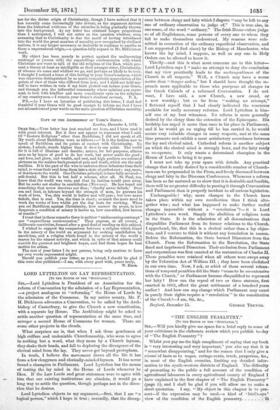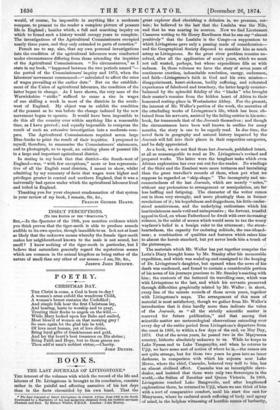" THE ENGLISH PEASANTRY."
[TO THE EDITOR OF THE"SPECTATOR."]
Stn,—Will you kindly give me space for a brief reply to some of your criticisms in the elaborate review which you publish to-day of " The English Peasantry " ?
Whilst you pay me the high compliment of saying that my book is " very interesting and very important," you also say that it is " somewhat disappointing," and for the reason that I only give a resume of facts as to wages, cottage-rents, truck, pauperism, &o., in most of the English counties, limiting my detailed infor- mation to the south-western districts of England. The difficulty of presenting to the public a full account of the condition of agricultural labourers in every agricultural county of England I have explained in the first chapter of " The English Peasantry" (page 5), and I shall be glad if you will allow me to make a short quotation. I say, " My object in this chapter is to pre- sent—if the expression may be used—a kind of bird's-eye' view of the condition of the English peasantry It
would, of course, be impossible in anything like a moderate compass, to present to the reader a complete picture of peasant life in England ; besides which, a full and searching inquiry on which to found such a history would occupy years to complete. The investigations of the Agricultural Commissioners occupied nearly three years, and they only extended to parts of counties."
Permit me to say, also, that my own personal investigations into the condition of the agricultural labourers were conducted under circumstances differing from those attending the inquiries of the Agricultural Commissioners. " No circumstances," as I state in my book, " happened between the two periods named"— the period of the Commissioners' inquiry and 1872, when the labourers' movement commenced—" calculated to affect the rates of wages prevailing at'the earlier date." But on the establish- ment of the Union of agricultural labourers, the condition of the latter began to change. As I have shown, the very news of the Warwickshire " strike " sufficed to cause a rise in wages of one shilling a week in most of the districts in the south- west of England. My object was to exhibit the condition of the peasant as he was before the change induced by the new movement began to operate. It would have been impossible to do this all the country over within anything like a reasonable time, as I have proved ; and equally impossible to compress the result of such an extensive investigation into a moderate com- pass. The Agricultural Commissioners required seven large Blue-books to print the result of their inquiries. I proposed to myself, therefore, to summarise the Commissioners' statements, and to photograph, so to speak, an existing phase of peasant life in a large and important agricultural district.
In stating in my book that that district—the South-west of England—was, "with few exceptions," more or less representa- tive of all the English rural districts, I meant to show, whilst admitting by my summary of facts that wages were higher and privileges greater in central and northern England, that it was a universally bad system under which the agricultural labourer lived and toiled in England.
Thanking you for your eloquent condemnation of that system in your review of my book, I remain, Sir, &c., FRANCIS GEORGE HEATH.



































 Previous page
Previous page